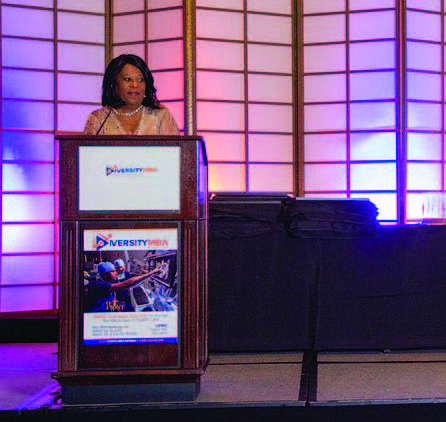DIVERSITYMBA FOUNDER WANTS COMPANIES TO INCLUDE RETENTION EFFORTS IN HIRING
Pamela McElvane (pictured) launched DiversityMBA as a way to showcase the importance of diversity and inclusion. She has also taken on another part of the equation: retention of diverse hires. Photo courtesy of Pam McElvane
While companies are focusing on diversity and inclusion in the wake of the deaths of unarmed Black people, Pamela McElvane says those companies should be just as focused on the retention of diverse hires.
McElvane launched DiversityMBA as a way to showcase the importance of diversity and inclusion. She has also taken on another part of the equation: retention of diverse hires.
McElvane, who is founder of DiversityMBA, started with Black MBA Magazine and Hispanic MBA Magazine. She said as the world changed and the United States became more focused on diversity in the workplace, 20 years ago, she wanted to broaden the scope about how she talked about and supported people of color first, and then women.
“As a corporate executive, in corporate America, I was looking for my next opportunity where I could be passionate about,” McElvane stated.
“The purpose was to find a way outside of the corporate environment and [to] be able to recognize people who were doing the work, and the communities, and as leaders,” and role models in the workplace, she said. “And, [to] bring them together and be able to uplift them to continue doing the work they were doing everyday and know there were other unsung heroes out there like themselves, pushing forward,” she continued.
McElvane said as a Black woman executive in corporate America, she sometimes felt isolated and understood what that could feel like. She said she wanted to create a platform that recognized corporate diversity leadership, progress, and one which celebrated progress at companies. She also wanted to uplift and celebrate achievements of individuals. Thus, DiversityMBA was born.
McElvane said the recognition platform became a major way to help organizations create loyalty and increase retention among leaders. She said it was strategically aligned with what companies wanted to do to recognize their talent. She said after 14 years, people continue to participate, but she wants to expand that.
McElvane said there are some companies which are using best practices and doing it correctly. But then, she said, there are some companies that are only giving lip service and who are not dealing with the real issues of Black and brown people not being in positions of leadership.
She used an example of companies that market to Black and brown communities, give back to those communities, but internally, do not have Black and brown people in leadership roles. “And you go internally and it’s different,” she said, adding that “We have privilege that is alive and well in the workforce and there are people who are in a bubble in these leadership roles making decisions.”
McElvane said CEO and heads of organizations are paying more attention to what’s happening in society and know it filters into the workforce. Now, they’re trying to figure out what they should do to combat racism and bias.
McElvane said companies are talking about diversity, equity and inclusion and now in the recruitment process, organizations are looking very closely at those processes and how they work. She said retention needs to be totally revamped and redone.
“In the on-boarding process, I dare companies to ask people of color, what would it take for us to keep you here beyond three years, what experience could you not have. And, people will tell them because the bubble exist within organizations where people of color, get on these teams, so they’re hired and they look great. And then, you’re on these teams and they’re all white, and for some women, including white women, if they’re all male, they feel equally isolated. And, so, that dominance and that outgroup behavior that you’re dealing with, you’re like, ‘I don’t want to come to work and deal with this everyday,’ “ she said.
McElvane went on to say that companies are learning to have a dialogue about racism in the workplace. She pointed out that companies are listening and they’re willing to do some things differently, but said it’s going to take time. “The hope is that with them listening and [being] willing to change the micro-inequities and micro-aggressions— and [to] help people [to] understand those behaviors, not just through training, but through consequence of accountability.”
Latest Stories
- Giannoulias Awarding $13 Million in Grants to Chicago Area Libraries
- The Messi Experience Officially Launches in Chicago
- WNBA's Chicago Sky Announces First-of-Its-Kind Partnership with Moonshot to Protect Players from Online Threats and Abuse
- YWCA METROPOLITAN CHICAGO HONORS FOUR OUTSTANDING LEADERS AT 2025 COMMUNITY CHAMPION AWARDS
- Governor Pritzker Announces 36 Awards Through Tourism Grant Programs
Latest Podcast
STARR Community Services International, Inc.

